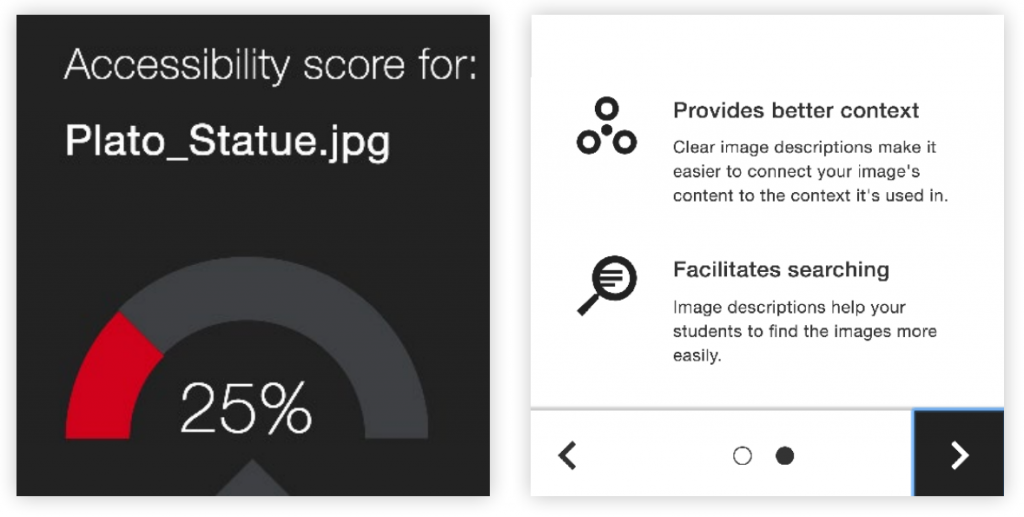USC is committed to the equitable and full inclusion of diverse learners into every aspect of campus life. As part of that commitment, we wish to support instructors in making classroom content accessible to the broadest audience possible through a new feature available in your Brightspace courses called Ally. Ally provides guidance on how to improve accessibility of your course materials.
For assistance with Ally, please email the ITS Ally Support Team at ally_usc@usc.edu
Ally Basics
Supporting Diverse Student Needs
Your class is full of diverse students with unique learning abilities, needs, and devices. Course content created with inclusion in mind can benefit not only your students with disclosed disabilities such as visual impairments and dyslexia, but improve the learning experience for all your students. Ally’s Alternative Formats and Instructor Feedback help make your course more inclusive for all!
Alternative Formats

Ally automatically generates eight unique “Alternative Formats” of your course files and HTML content, and makes them available for download to you and your students. Formats are designed to work better with assistive technologies, mobile devices, and study tools. Select the “A” icon or anywhere you see “Alternative Formats” in your course to open the modal (pictured left). Based on the original file, you will see your list of available options. Choose the option you want and click “download.” Your original file will not be affected by the alternative formats.
Accessibility Indicators
Addressing accessibility issues with your course content can improve the quality of the Alternative Formats for your students. To help you address those issues, Ally provides accessibility feedback within your course workflow. Log-in to your course site, and you will find the Accessibility Indicators (pictured below) next to files (Word Docs, PowerPoints, PDFs, Imagers). If you have no course files yet, upload one, and an indicator will appear next to the file name after a few minutes. Select the indicator to view the Instructor Feedback. Follow along step-by-step to address the issues identified.

View File Accessibility
Accessibility Feedback
Not sure about how to identify and correct accessibility issues with your course content? Not to worry. Ally provides you detailed feedback and support to help you become an accessibility pro. Learn about accessibility issues, why they matter, and how to fix them. Green is the goal!
Find the Ally Indicators

Your course files and content will now have color “dials” next to them. They indicate the file’s level of accessibility, and are there to help you prioritize which files you want to fix first. Don’t worry, your students can’t see them. If you hover over the indicators, you’ll see if the accessibility score is “low,” “medium,” or “high.” Select the indicator to see the percentage score, specific issues affecting the file, and instructions for improving the file.

How to Fix Accessibility Issues
If you see a red indicator dial next to a file:

You notice the red indicator appear after adding a new file to your course. Or, your institution just added Ally, and now you see a red indicator next to your course file. You mouse over to the red dial and see the “accessibility score” when you hover over the indicator.
When you select the indicator, Ally walks you through a series of steps to make the file more accessible. Ally organizes this feedback in a decision tree, so all you need to do is read the directions and respond to the prompts. Learn what the issue is, why it matters, and how to correct it appropriately.

In some cases, Ally will allow you to make the fix directly, such as adding an alternative description to an image file. In other cases, Ally links you to resources to help solve the problem in the tools you’re using to create content. Once you’ve made the necessary fixes in your authoring tool, upload the new file directly to Ally and watch your score improve.

Frequently Asked Questions
Why is Ally in my course?
Ally is enabled for all courses in Brightspace at USC so students can access alternative formats of their course materials and help instructors offer more accessible course materials.
Who sees or has access to my course accessibility score?
Only you and Brightspace administrators have access to your course accessibility score.
What content does Ally check?
- PDF files
- Microsoft® Word files
- Microsoft® PowerPoint® files
- OpenOffice/LibreOffice files
- Uploaded HTML files
- Image files (JPG, JPEG, GIF, PNG, BMP, TIFF)
- WYSIWYG/VTBE content
- YouTubeTM videos embedded in WYSIWYG/VTBE content
I want help making my course materials accessible, where do I go?
Please use the tools available in Ally. You can find step-by-step instructions here: Ally Help for Instructors.
I have a student with an accommodation letter and need my course materials to be made accessible, where do I go?
Please contact the DSP Assistive Technology Team, dspat@usc.edu, to make arrangements.